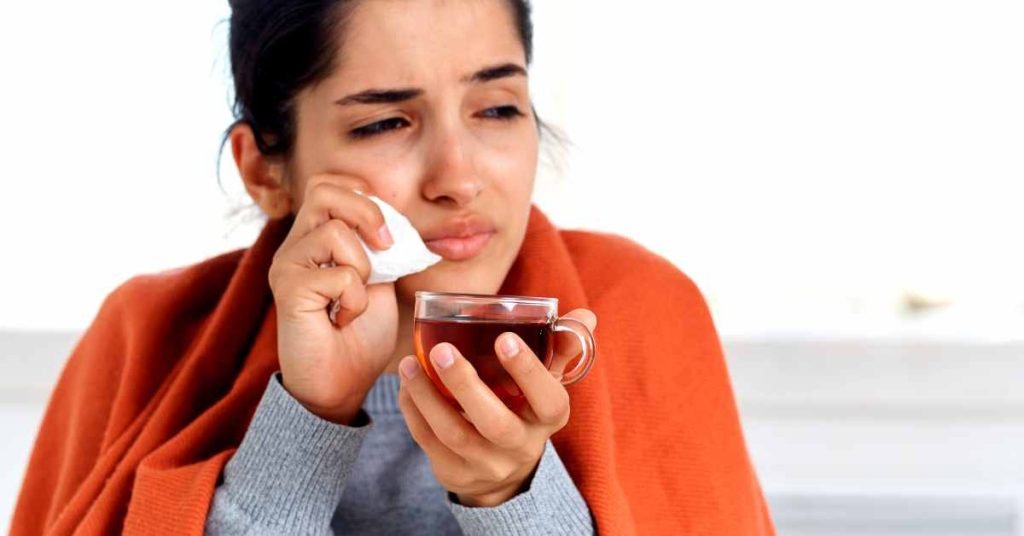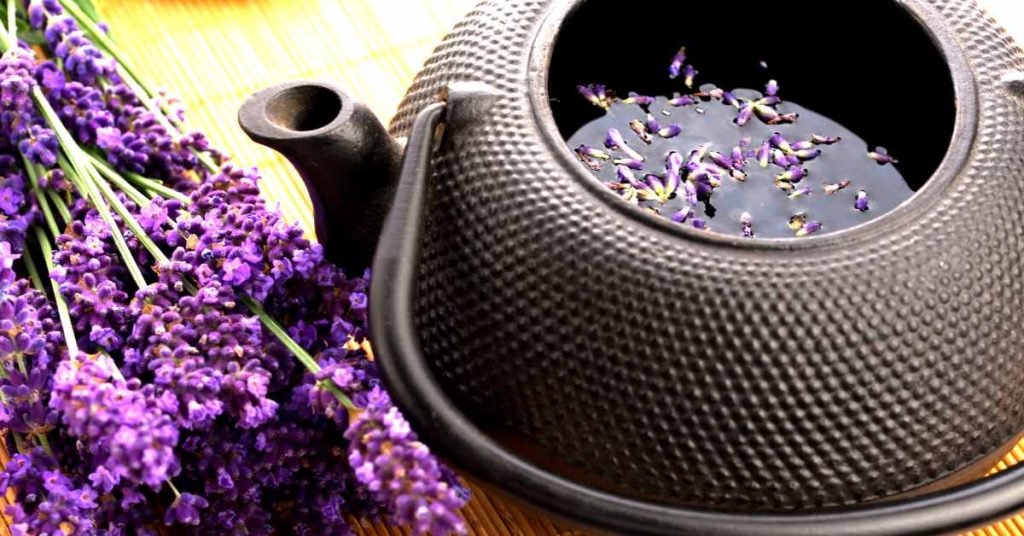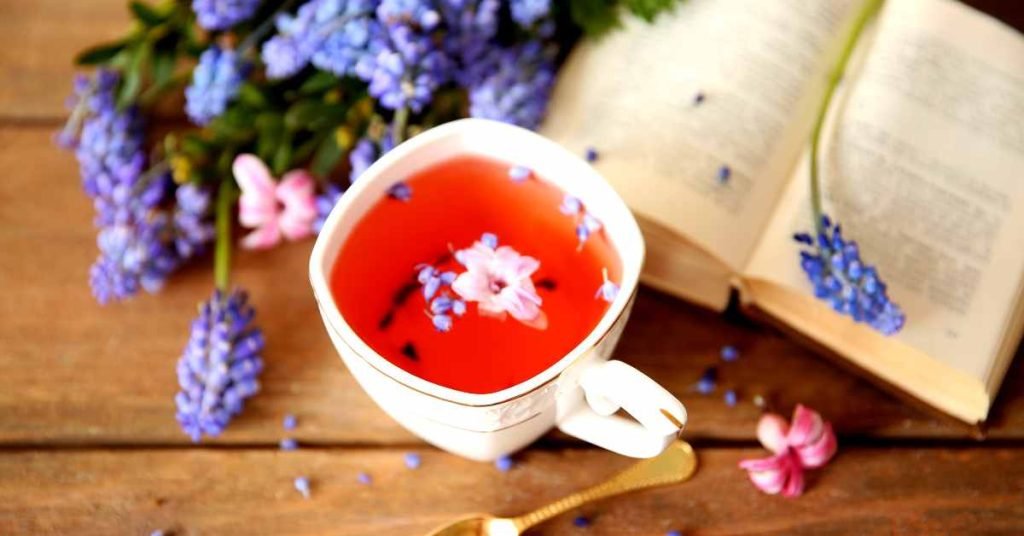It’s eye-opening to discover that cough relief can be had from a cup of tea rather than a bottle of cough syrup. You don’t want to miss this read, especially now that we are in the thick of seasonal illnesses and COVID.
What Causes Coughing?
Coughing is a defense mechanism to help our respiratory system pass things that aren’t supposed to be in our airways.
Whether it’s mucus, or something foreign (dust, food, microorganisms, etc.), it’s got to come out or we are in trouble.
Coughs often accompany illnesses, and just the act of repetitive coughing causes inflammation and pain.
That tickle we feel in the back of our throat triggers our brain to perk up and take notice that something might be on the near horizon with our health.

Then the cough begins. By this time, we are perusing the aisles of our local pharmacy for a remedy.
Why waste time and money when a natural solution might be in your kitchen pantry?
Conventional medicine has most of us reaching for over-the-counter drugs that contain unnecessary drugs and ingredients in many all-in-one cough/cold/sore throat/fever/flu medicine.
Cough medicines have evolved into so many different options that we rarely know what’s best for our needs.
Other conditions may cause a cough that is illness-related such as COPD (chronic obstructive pulmonary disease,) GERD (gastroesophageal reflux disease,) asthma, or lung cancer.
Whether we cough from being sick or a chronic condition, we need relief.
So, what is the fastest way to help a cough naturally?
Why Is Tea Good For Cough Associated Illness?
A cup of warm tea for cough may be the very thing to try before downing bad-tasting cough syrups.
Tea is a great preventative to sore throats, coughs, and more. Researchers conducted a study (“Impact of Gargling on Respiratory Infections“) that mentions green tea being an effective intervention to prevent respiratory infections.

The study noted that the Japanese use of green tea as a gargle solution acted as a defense by reducing the risk of respiratory infection.
Catechins and theanine (constituents found in tea) are responsible for protecting those who consume (or gargle) with tea.
Now, most of us would much rather drink our tea rather than gargle with it. How do we know what type of tea helps with coughing? Let’s take a look at some teas and how they help coughing.
What Is The Best Tea For Cough?
Remember that tea should never be a replacement for medical treatment.
If you have medical conditions, are taking medications, or are undergoing radiation/chemotherapy, talk to your healthcare provider about consuming tea.
Tea may aggravate medical conditions or interact with medications (and chemotherapy/radiation treatments.)
We don’t have the medical expertise to be able to recommend or provide advice on consuming tea; however, we can provide you with data-backed information to help guide you.
If you have the “green light” to drink tea, we have some teas to try when coughing begins. Tea may also help other illness-related symptoms!
Best Tea For Sore Throat And Cough

Sore throats and coughing go hand in hand with the flu, upper respiratory infection, and many other illnesses.
Often, coughing itself can cause a sore throat. Tea is soothing to an inflamed sore throat while also quieting a cough.
Honey Lemon Tea
Honey is nature’s best medicine. A study on honey (“Honey and Health: A Review of Recent Clinical Research“) confirms it has many benefits that include antibacterial and anti-inflammatory. The added Vitamin C from lemon gives the immune system a needed boost. Honey tea for cough and sore throat is a great go-to tea.
Turmeric-Ginger Tea
Turmeric is a spice that proved to be highly beneficial as an anti-inflammatory per a study done (“Curcumin: A Review of Its’ Effects on Human Health.”) By adding a dash of black pepper to a cup of this tea; the spiciness nurtures the inflammation that comes from sore throats and inflamed airways from coughing.
Ginger provides pain relief while fighting inflammation, as indicated in “Herbal Medicine: Biomolecular and Clinical Aspects.” Ginger tea is one of the most popular teas consumed when symptoms of colds and flu develop.
Green Tea
Green tea is an all-around healthy tea with anti-inflammatory, antibacterial, and antiviral benefits (as indicated in the earlier mentioned study on the Japanese gargling with it.)
Best Tea For Cold And Cough

All of the above teas are beneficial for cold and cough; however, there are a few that help other symptoms associated with colds.
St. Luke’s Alternative Medicine published an article that mentions certain herbs that may prove beneficial for colds and coughs. We have included herbal teas (tisanes) that contain the mentioned herbs.
Garlic Tea
Garlic is more of a preventative than a symptom reliever.
Lavender Tea
The relaxing benefits of lavender help calm the muscles in our airways and throat.
Peppermint Tea
Peppermint is highly aromatic, helping to relieve congested noses. Peppermint also perks up the mind making us feel recharged.
Eucalyptus Tea
Eucalyptus is also aromatic, but it also acts as an expectorant.
What Tea Is Good For Mucus?

Phlegm and mucus are symptoms of upper and lower respiratory illnesses and conditions.
A published research article entitled “Cough Suppressant Herbal Drugs: A Review” notes certain herbs being beneficial as an expectorant. These herbs include licorice root and eucalyptus.
Licorice Tea
Two constituents found in licorice (triterpene saponins and flavonoids) are beneficial in relieving symptoms that accompany respiratory-related illnesses.
What Drinks Are Good For Cough?
While tea is very popular for helping a cough, many people consume coffee with honey.
Most any warm liquid washing over the throat helps to relax us from coughing. A mere glass of warm water with honey does the trick. Staying hydrated when down with a cold, flu, COVID, or any other illness is important.
That, along with plenty of rest, are the keys to recovery.
Why compromise on taste for warm liquids when recovering when there are so many options for harnessing the benefits of herbal teas (tisanes) that will target your symptoms while helping you get better?
The Tea Lady’s Special Cough Tea Blend

This special blend provides the invigorating aroma to inhale, relax, and quiet a cough.
Green Minty Lavender Honey Tea
Servings: 1
- 1 teaspoon of Organic Peppermint Green loose leaf tea
- ½ teaspoon of lavender loose tea
- 1 teaspoon of local organic raw honey
- 2 cups of water
- Place the loose leaf teas into a tea infuser.
- Warm the water until it reaches 180 degrees.
- Pour the hot water into a teapot and drop the tea infuser into the teapot.
- Cover and allow the tea to steep for 5 minutes.
- Pour the tea into a teacup
- Add the honey, stir and enjoy.
Cough Relief Is Only A Teacup Away!
Tea is one of life’s luxuries that soothe our soul and physical body.
It picks us up and helps us to feel better. By having a few of the best teas for cough in your medicinal arsenal, you will discover that tea is just as good when you are healthy as it is when you are sick.
After all, “It’s Never Not Teatime!”
MEDICAL DISCLAIMER
Itsnevernotteatime.com cannot and does not contain medical/health advice. The medical/health information is provided for general and educational purposes only and is not a substitute for professional advice.




